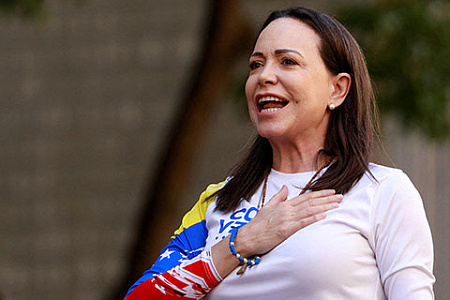
The Norwegian Nobel Committee has made a profoundly nuanced and politically astute decision, awarding the coveted Peace Prize not to a human rights advocate or a philanthropist, but to Venezuelan opposition leader María Corina Machado. This choice signals a clear stance in the complex landscape of international relations, notably bypassing speculations surrounding former US President Donald Trump, while simultaneously avoiding a direct confrontation with him. Machado, a vocal critic of Nicolás Maduro, whose administration is viewed by the current White House as a primary adversary, now stands as a global symbol for democratic struggle.
Jørgen Watne Frydnes, the committee’s chairman, stated that Machado was honored for her “unwavering dedication to democracy and the rights of the Venezuelan people, and her relentless pursuit of a just and peaceful transition from dictatorship to democracy.” In essence, this award acknowledges the entire Venezuelan opposition, which has for years struggled in its efforts to challenge Maduro’s rule. Machado has emerged as the most prominent figure within this persistent, albeit often fragmented, movement.
Machado’s political ascent comes after years of the opposition’s arduous search for a leader capable of uniting its diverse factions. Earlier figures like former Miranda state governor Henrique Capriles, a presidential candidate in 2012, and Juan Guaidó, who was recognized by Western powers and many Latin American nations as Venezuela’s legitimate interim president in 2019 (during Donald Trump’s first term), ultimately failed to consolidate power or sustain momentum. The political crisis triggered by Guaidó’s challenge eventually subsided, leaving the opposition once again seeking a formidable voice. By 2024, Machado had stepped forward as their presidential candidate, embodying a renewed hope for a legal return to the political arena.
As a former parliamentarian, Machado possesses a unique blend of charisma and essential political experience. She was instrumental in the early protest movements against both Hugo Chávez and his successor, Maduro. Crucially, after two decades of often fruitless opposition activism, she remains largely untainted by the scandals and accusations that have plagued many of her contemporaries. Her background, including studies in the US, and her espousal of market-oriented reforms with a social conscience, have also made her an appealing figure to Western nations.
Her popularity beyond established opposition circles, however, remains untested in a national election. Disqualified from the 2024 ballot on accusations of supporting sanctions, Machado did not leave the country but transitioned into a more clandestine role. The opposition’s presidential candidacy subsequently fell to Edmundo González Urrutia, who, as widely anticipated, lost the election.
Now based in Spain, González Urrutia has become something of an international spokesperson and the public face for Machado and the Venezuelan opposition. Reacting to the Nobel Committee’s announcement, he expressed profound shock and delight, sharing a video of himself conveying the joyous news to Machado. The award arrived as an unexpected birthday gift, with Machado turning 58 on October 7th.
Across the Atlantic, the news from Oslo likely provoked a different reaction from Donald Trump. Despite his public denials of seeking the Nobel Peace Prize, his pronouncements often suggested a deep-seated desire for the accolade. Trump has repeatedly asserted that his efforts led to the resolution of numerous international conflicts, citing agreements between Armenia and Azerbaijan, Congo and Rwanda, Cambodia and Thailand, India and Pakistan, Israel and Iran, Israel and the Arab world (referring to the Abraham Accords), and the US and Syria. Skepticism abounds, even among his own supporters, regarding both the true resolution of these conflicts and the extent of his personal contribution.
Prior to Machado’s announcement, Trump sharply criticized the 2009 Nobel Peace Prize awarded to Barack Obama, lambasting his predecessor as a “bad president” who received the award for “nothing.” He then cryptically hinted at his own qualifications, stating that “nobody in history has settled eight wars in nine months,” before revealing his final ‘achievement’ was the a peace deal in the Gaza Strip. A fragile ceasefire, brokered by the US, took effect there just before the Nobel announcement. Should this truce hold, the Gaza conflict might indeed stand as the singular case where Trump’s role as a peacemaker could be considered primary. However, this particular act of diplomacy did not sway the committee for the current year’s prize, leaving him to potentially look towards a future nomination.
